Makings of a Midwife
The role of a midwife extends far beyond delivering babies.

Alison Clark started her career as a midwife in the United Kingdom, where, she says, it’s standard practice for midwives, not doctors, to deliver babies. When she followed her husband to the United States several decades ago, she trained in the American style of midwifery. She became a Certified Nurse Midwife, an advanced-practice registered nurse with a specialization in obstetrics and gynecology; the main difference between what she did in the U.K. and what she does in the U.S. is that she now has the authority to prescribe medicine.
In her practice, Clark offers a holistic approach to care for women who may want non-traditional options in their childbirth experience. “There are some natural doctors, but usually doctors have the reputation for being more medically conventional,” she says. “Having a baby is about choices. Women and their partners need to do research and decide on what works for them.”
Her patients’ OB/GYNs still play a central role in pre-natal care and deliveries, of course. Clark works collaboratively with doctors to meet the desires of the patients. And she loves working at Touro because the hospital is more open to alternative birthing procedures.
“For example, I think it’s great that Touro offers water birth,” she says. “I’ve worked at other hospitals in the New Orleans area, and doctors there typically don’t do them.”
Sometimes Clark’s patients want medical deliveries with epidurals, and sometimes they prefer the natural route without pain management. She looks to advise patients on their options and fulfill their wishes. However, she chooses not to offer supervised home births for her patients. Although home births are nice from a comfort point of view, Clark prefers to stage deliveries in the safety net of a hospital setting, should any complications arise. When they do, and a patient needs emergency surgery, Clark, again, is there to assist.
Indeed, assisting patients through whatever happens is what she and other midwives bring to the table. Doctors are typically quite busy with surgeries and a calendar full of patient appointments, so midwives are able to pick up the slack. They have the luxury of time to fluff the pillows, hold hands and calm fears.
Clark is more involved in her patients’ health care than just during deliveries. Her work entails managing the patient from the beginning of a pregnancy to the end — and often involves pre-conceptual care. After the delivery, she teaches new moms about the ins and outs of breastfeeding while also assisting with a variety of postpartum issues.
As a Certified Nurse Midwife, Clark is also qualified to assist her patients throughout their lives —not just around the time of giving birth. She does annual exams, prescribes birth control and offers general gynecological care.
“Midwives and their patients create a personal bond,” she says. “It’s a bond that stays there long after a baby has been delivered. That’s why my patients often continue to see me for their care.”
